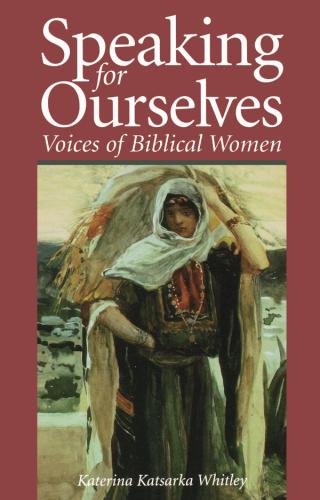Speaking for Ourselves
Speaking for Ourselves
VOICES OF BIBLICAL WOMEN
Katerina Katsarka Whitley
Copyright © 1998 by Katerina Katsarka Whitley
Morehouse Publishing
P.O. Box 1321
Harrisburg, PA 17105
Morehouse Publishing is a division of The Morehouse Group.
All rights reserved. No part of this book may be reproduced or transmitted in any form or by any means, electronic or mechanical, including photocopying, recording, or by any information storage and retrieval system, without written permission from the publisher.
Printed in the United States of America
Cover art: Jewish Museum, New York/SuperStock. Ruth Takes Away the Barley by James J. Tissot.
Cover design by Trude Brummer
Library of Congress Cataloging-in-Publication Data
Whitley, Katerina Katsarka.
Speaking for Ourselves : voices of biblical women / Katerina Katsarka Whitley.
p. cm.
Includes bibliographical references.
ISBN 0-8192-1758-1 (pbk.)
1. Women in the Bible. I. Title.
| BS575. W533 1998 | 98-38339 |
| 220.9'2'082—dc21 | CIP |
To Dorothy L. Sayers and C. S. Lewis, and to DeWitt Myers and Rudy Whitley— all guides to the Light
Contents
1. To a Poor Girl, Such Promises!
2. Was This the Promise God Had Given Me?
6. Even the Dogs Eat the Crumbs
7. Spending It All for the Saints
The First Convert in the Land of Alexander
Tamar Confronts Her Father, King David
Gomer’s Account of Her Story in Two Parts
Acknowledgements
I am grateful to all the parishes and women’s groups that have invited me to present some of these monologues in the place of a sermon or on other occasions, and to the rectors who offered me the pulpit, especially to the Reverend Judson Mayfield, who first said that Mary’s monologues belong within the celebration of the Eucharist. The reaction of the listeners filled me with surprise and awe, and convinced me that I should make these available to readers and to other interpreters of the Word.
It is difficult to thank all the writers who influenced me in my understanding of these women of the Bible. Eternal gratitude to my father, who read the Bible to me when I was too young to know anything but the feeling the stories created in me of beauty, terror, sacrifice, and love. To Dorothy L. Sayers and all the writers and teachers who helped me emerge from the literal reading of the Bible into the light and terror of biblical criticism, I owe many thanks.
I want to thank Marilyn Bentov, Ph.D., for teaching me the meaning of the midrash. “Miriam’s Secret” was written in her class as a midrash exercise.
The Syrophoenician woman’s contribution to Jesus’ understanding of his mission to the rest of the world, not just “to the children of the house of Israel,” I owe to Bishop Bennett Sims, who preached on this story in Anaheim, during the 1985 General Convention of the Episcopal Church, and caused me to look at her with new eyes.
My son-in-law, Kenneth Craig, Ph.D., with his love and knowledge of the Old Testament, helped me see the women with a deeper understanding of the historical circumstances surrounding them.
My friend Linda Chamberlain, who heard me read the first monologue, “To a Poor Girl, Such Promises!” and asked with enthusiasm, “Do you know what a strong feminist story this is?” gave me the idea to explore this liberation theme in the lives of other biblical women.
And to my two daughters, Niki and Maria, I owe the warmest thanks for teaching me the wonder, awe, and tender love (storgé) of motherhood. They have made all the mothers in the Bible
